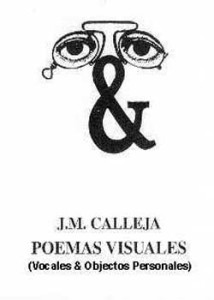| THE IMAGINED BODY OF THE VOCALS OF J.M. CALLEJA |
Gustavo Vega
|
| The poetic-visual activity of J.M.Calleja encompasses both the fields of two-dimensional visual poetry, such as those of objectual poetry, installation and action. His creations are sometimes based on the metaphor, but sometimes on the analogies and references of the forms of their component elements. Thus, the letters, in their hands – and especially the vowels -, sometimes lose their status as a vehicle of phonic meanings – totally or partially – and they become a sign of other things.
His method consists – generally – to show some of the possible analogies of the forms of the bodies of the letters and the forms of the bodies of the other beings that inhabit the universe. Thus, for example, a letter “a” written in the form of a round letter, becomes an anthropomorphic image in front of the poet’s eyes. His breast is a round belly full of fantasies. But the letter “a” is the first letter of the alphabet – and the first letter of love, hug, anxiety … -. It is the letter that opens up the universe of the word -the world is only cosmos when it is called by the word, it orders it, and the alphabet can be seen as a symbol of the word, of the language it calls it. But life is a short chain of short moments, and what creates human language are just ephemeral butterflies (1). And life that is a go being at the same time returned, is expressed as a double unit when the letter “a” returns to itself and incorporates, to further clarify the concept, a single-way ticket to its own. It is the idea of an eternal return that can be contemplated in the cyclical movements of a more or less broadly cosmos, which is always brief when it is experienced in human beings (2). But inverted “a” seems an “e”. And joining them – as JMCalleja does – are heard in front of their gaze and, as a source of bodies, they are mixed with fierce astragos – universal correspondence of opposites, reflecting our original identity – , and its existence is transformed into an instant of pleasure (3). And the “e” is an eh ?! that looks around and investigates, and as a being born in the world. As a child who shows our natural tendency to see everything, swallow everything, swallows the world with his mouth open and stores it in his skull. In a brain that is written, which is made up of enigmatic graphisms (4). And the “i” is a copulative conjunction, the link that joins a say and the other to say. Deadly game of existence, J.M.Calleja shows this letter crowned with the opaque look of a skull, for the enigma of an existence that was, of an existence that begins. To die, to live, both sides, of the same reality, of the same unreality, of the same saying. That is why, between one word and another, the letter “i”. Copulative conjunction, or tattoo, mask. The “i” is also seen by the author as a face or mask. As a personal identifier of a being that is life and at the same time dead. Person comes from Latin for Sonare or from Greek prosopon- which is the same, the mask that identified the characters in the representation of the theater of the world, of life. And the “i” fulfills the work of J.M.Calleja this identifying role, personalizer (5). The “o” fills all the holes. Destroyed the speeches and the meanings, it introduces us as a mantra in the world of silence, of the pure vibration: ommmmm, ommm, mother, or …, of music without time. Or …, mother, ommm, mother … to return to the word again. The ultimate sense of poetry: to reveal how everything is in everything, and everything is full, empty … like an “O” that occupies the whole body of the instrument – spirit to move the spirit, to transcend the prose of the instant- (6). The “u” is the final letter or final abyss of the vocal world. A silhouette of a woman goes out into the abyss. Light, like thought, sometimes hurries. But our gaze is resisted – the silhouette makes a visual counterweight on the precipice – although we know that death is always ready to transform life. Although we know that death thinks us with its vertigo face and sadness (7). Transformation river, place of disappearances and apparitions, the “U” can reverse its significance and become a bridge on the substratum, from which new branches emerge, a new vocabulary to give meaning to the world, new meanings, new cosmos (8). But J.M.Calleja does not write only with vowels. He also does it with consonants and many of the other things that inhabit the universe: with personal objects such as pencil (9), clocks, scissors (10), combs (11), keys …, or with intimate objects, so Intimate like a skeleton. Like this skeleton that we have hidden and that dreams us (12). 1 The first (1998) |
|
|
Text of the Vocals & Personal Objects catalog. La Caraba Cultural Center. Barakaldo 2001 |
|

